Understanding the Influence of Alcohol on Fetal and Neurodevelopment
The question of whether alcohol consumption can cause autism spectrum disorder (ASD) is a complex one, rooted in the broader context of prenatal development, neurobiology, and behavioral health. While it is well-established that excessive alcohol intake during pregnancy can lead to fetal alcohol spectrum disorders (FASD), which include physical and neurodevelopmental issues, current scientific evidence does not support a direct or causal link between low-level alcohol use and ASD. This article explores the scientific landscape surrounding alcohol's impact on fetal development and its possible connection to autism.
Risks of Alcohol Consumption During Pregnancy and Fetal Development
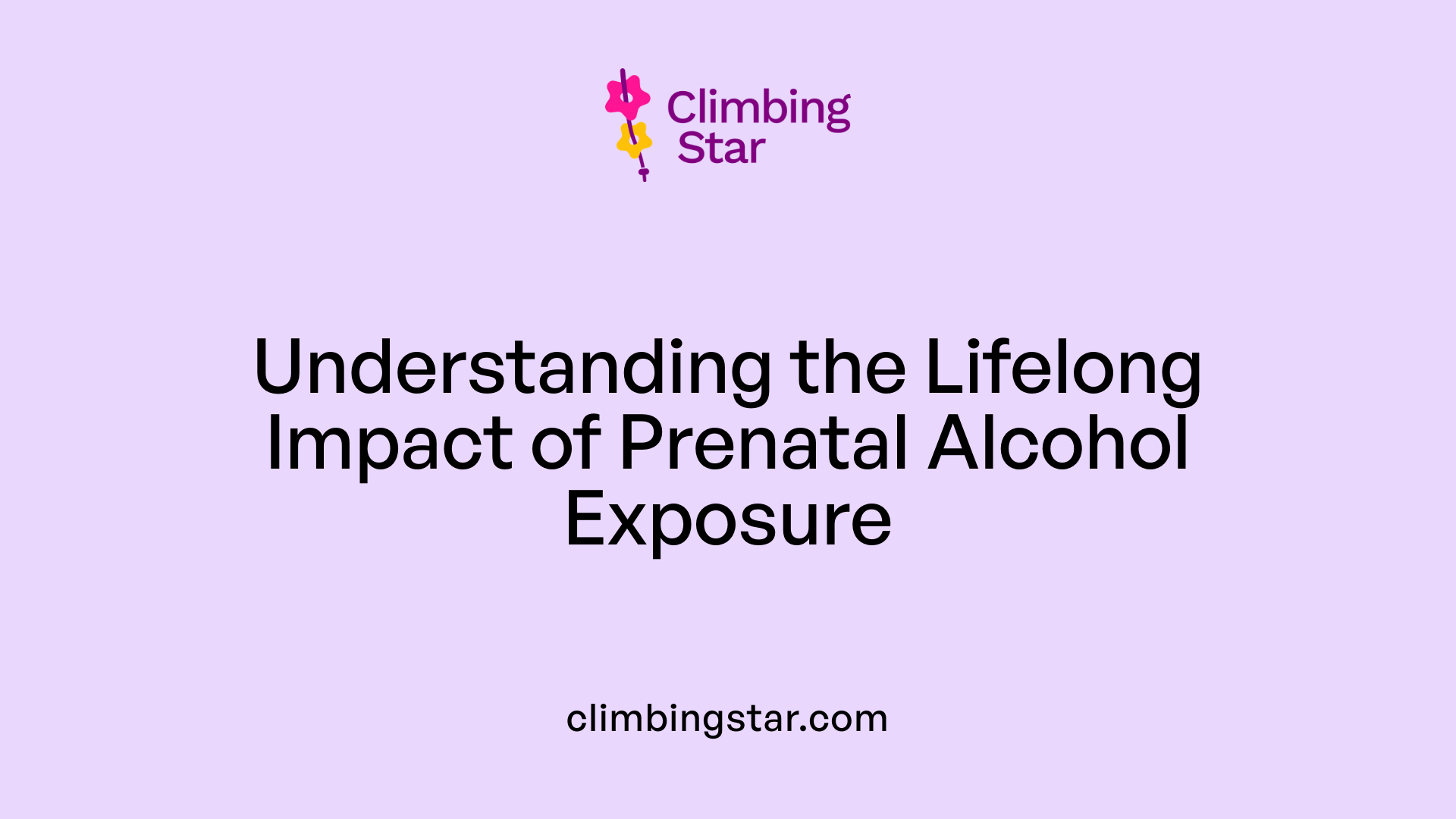
What are the risks of alcohol consumption during pregnancy, particularly concerning fetal development?
Alcohol use during pregnancy can have serious consequences for the developing fetus. It is linked to a range of physical and neurocognitive impairments that can last a lifetime. When a pregnant woman consumes alcohol, it crosses the placenta and affects the fetus directly.
One of the most recognized conditions caused by prenatal alcohol exposure is fetal alcohol spectrum disorder (FASD). FASD includes several associated conditions, with fetal alcohol syndrome (FAS) being the most severe. FAS is characterized by distinct facial features, growth restrictions, and brain abnormalities.
Children exposed to alcohol in utero may face challenges with learning, memory, and behavior. Motor skills can also be compromised, impacting daily activities and development. The severity of these issues depends on how much alcohol is consumed and at which stage of pregnancy.
Research confirms that there is no safe level of alcohol consumption during pregnancy. Even small amounts, such as a single drink, have the potential to cause harm. Therefore, healthcare professionals strongly advise complete abstinence from alcohol throughout pregnancy.
Prevention of alcohol use during pregnancy is critical to avoid preventable developmental issues. It is important for expectant mothers to be aware of these risks and make informed choices to protect their babies from lifelong disabilities caused by alcohol exposure.
Examining the Link Between Alcohol Consumption and Autism Spectrum Disorder (ASD)
What is the relationship between alcohol consumption and autism spectrum disorder?
Research investigating the connection between alcohol use during pregnancy and ASD has not found a direct or significant link. Current studies suggest that low-level maternal alcohol intake before conception and during pregnancy does not increase the risk of autism spectrum disorder in children.
While high prenatal alcohol exposure is associated with fetal alcohol spectrum disorders (FASD), which involve physical deformities and neurodevelopmental issues, moderate or low alcohol consumption appears to have no clear effect on ASD risk. In fact, some evidence has pointed to an inverse association, indicating that light alcohol use might be linked to a reduced likelihood of ASD. However, this apparent protective effect is most likely due to biases or confounding factors, rather than a causal relationship.
Women are still advised to avoid alcohol during pregnancy because of well-understood dangers such as fetal alcohol syndrome (FAS) and other developmental problems. The consensus is that any alcohol intake during pregnancy carries potential risks, but current research shows no strong evidence linking moderate or low alcohol use to the development of ASD.
| Aspect of Alcohol Use | Impact on Fetal and Child Development | Notes |
|---|---|---|
| High prenatal exposure | Increased risk of FASD and neurodevelopment issues | Severe effects at high levels |
| Low to moderate exposure | No clear link to ASD | Some studies suggest potential inverse association |
| Alcohol in breast milk | No ASD risk; may affect early motor and reasoning skills | Not a cause of ASD |
| Illegal drug use during pregnancy | Harmful but not linked to ASD | May cause speech delays or behavioral problems |
| Certain medications (e.g., valproate) | Can increase ASD risk | Especially anti-seizure medications |
Overall, evidence supports abstaining from alcohol throughout pregnancy to ensure optimal fetal health, even though the specific link between low-level alcohol intake and ASD remains unproven.
Biological and Developmental Perspectives on Alcohol’s Impact on Brain Development
Maternal alcohol use during pregnancy can influence fetal brain development through several biological and developmental mechanisms. Alcohol exposure can interfere with critical processes such as neurogenesis, which is the formation of new neurons, synaptogenesis, the development of connections between neurons, and myelination, the process of insulating nerve fibers to ensure efficient communication.
One significant concern is the potential for neuroinflammation and oxidative stress induced by alcohol. These effects can damage developing brain tissue, disrupting normal growth and function. Neuroinflammation involves immune responses in the brain that, when chronic or excessive, may impair neural development.
Genetic and epigenetic factors also play a role in how alcohol impacts neurodevelopment. Alcohol exposure can cause epigenetic changes—modifications on DNA or associated proteins that influence gene activity without altering the DNA sequence itself. For instance, DNA methylation alterations caused by alcohol can dysregulate genes involved in brain development, possibly affecting pathways linked to autism spectrum disorder.
Despite these biological pathways, large-scale studies have shown that low to moderate maternal alcohol consumption during pregnancy does not have a clear association with increased autism risk. Nonetheless, the complexity of the interactions means that overall, any alcohol intake during pregnancy is discouraged because of its well-established risks for fetal alcohol syndrome (FAS) and other developmental issues.
In summary, biological evidence underscores how alcohol can influence multiple facets of neurodevelopment, from cellular structure to gene expression. These changes might contribute to neurodevelopmental conditions, including ASD, especially in cases of high prenatal alcohol exposure, which are more clearly associated with neurodevelopmental problems.
| Aspect | Impact of Alcohol | Relevance to Autism Spectrum Disorder |
|---|---|---|
| Neurodevelopmental Processes | Disruption of neurogenesis, synaptogenesis, and myelination | Potential alterations linked to ASD traits when these processes are affected |
| Neuroinflammation & Oxidative Stress | Chronic inflammation and oxidative damage in brain tissue | May contribute to neurodevelopmental divergence, including ASD risk |
| Genetic & Epigenetic Effects | DNA methylation changes affecting gene expression | Modulates neurodevelopmental pathways that could influence ASD development |
While the biological pathways provide a basis for understanding how prenatal alcohol might influence neurodevelopment, current research indicates that the relationship with ASD is not straightforward. The overall evidence suggests that avoiding alcohol during pregnancy remains a crucial recommendation to prevent various developmental risks.
Scientific Evidence and Theories Concerning Alcohol as a Cause of Autism
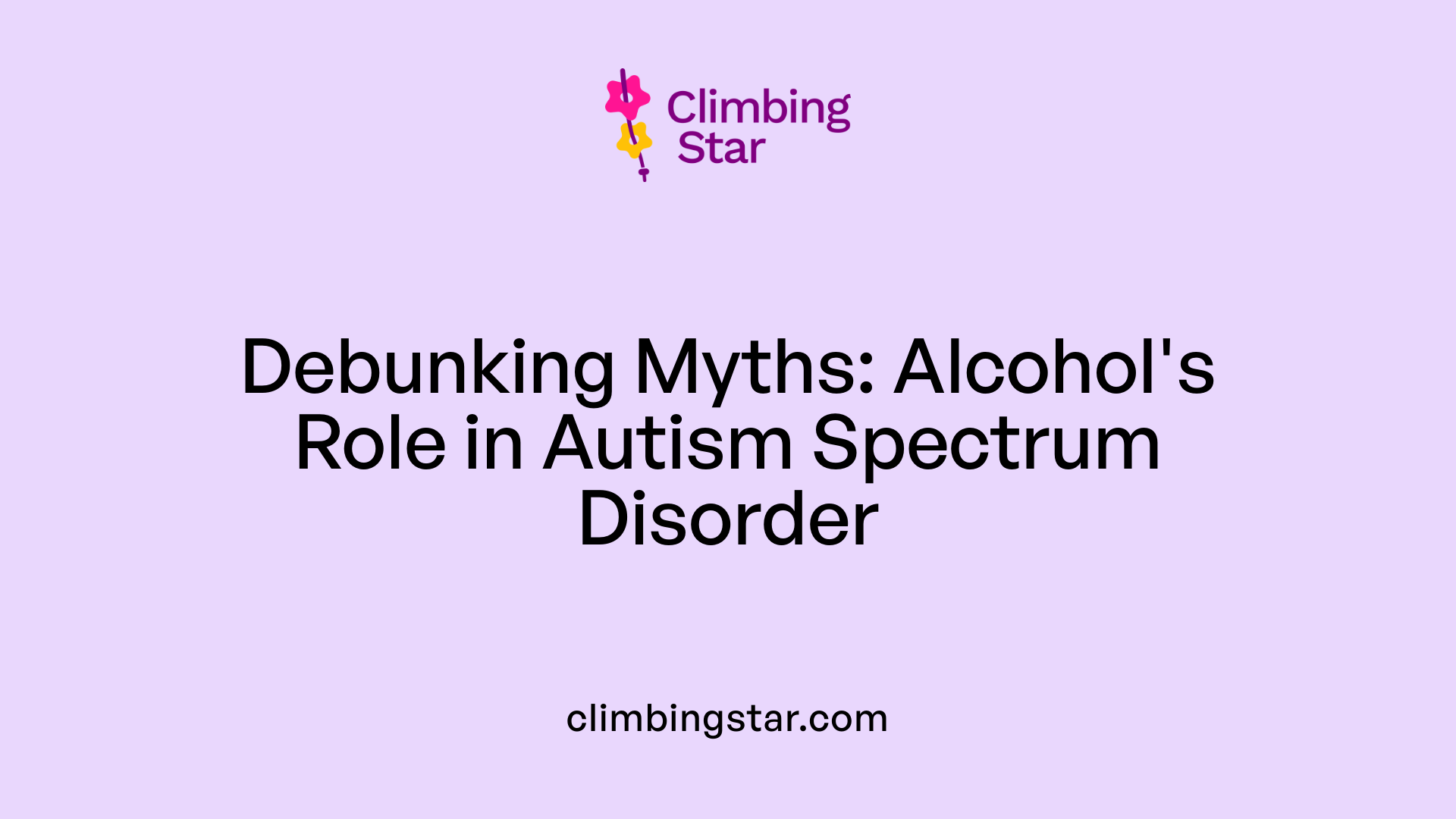
What does current scientific research say about alcohol as a factor in autism causes?
Research to date suggests that alcohol consumption during pregnancy is not directly linked to an increased risk of autism spectrum disorder (ASD). In fact, studies show no positive association between low to moderate alcohol use before conception and during pregnancy and the development of ASD. High prenatal alcohol exposure, however, is known to result in fetal alcohol syndrome, which involves physical and neurodevelopmental impairments but is distinct from autism.
Research indicates that while alcohol in pregnancy can cause developmental issues, including speech delays and behavioral problems, it does not appear to be a clear causal factor for ASD. The only medications with a confirmed increased risk are certain anti-seizure drugs like valproate, which significantly raise the likelihood of ASD.
Interestingly, in clinical settings, individuals with ASD tend to have higher rates of alcohol use disorder. This may be related to self-medication for managing sensory sensitivities, social difficulties, or anxiety. Autistic traits often include sensory processing differences, which can influence alcohol consumption patterns—some use alcohol to cope with overwhelming sensory environments.
Furthermore, autistic traits usually correlate with less frequent alcohol use during adolescence, especially traits related to social preferences and rigidity. The relationship between alcohol and autism is complex and multifaceted, involving environmental, genetic, and social factors. Ongoing research seeks to clarify these pathways and inform more effective screening and tailored interventions.
Emerging evidence underscores the importance of understanding individual differences among autistic adults, particularly regarding their sensory profiles and coping mechanisms, to better support their needs and address potential substance use issues.
Additional Information
| Substance/Factor | Effect on Autism Risk | Notes |
|---|---|---|
| Alcohol during pregnancy | No increase in ASD risk | Can cause fetal alcohol syndrome, which is separate from ASD |
| Cocaine use | Does not directly cause ASD but increases risk | Most mothers using cocaine do not have ASD children |
| Marijuana and opioids | No evidence linking to increased ASD risk | Can cause other developmental delays |
| Methamphetamine exposure | No link to ASD; affects cognitive development | May cause other neurodevelopmental issues |
| Anti-seizure medications | Certain drugs like valproate increase risk (from 1.9% to 4.4%) | Significant for at-risk pregnancies |
| Antidepressants/Antipsychotics | No proven association | Continues to be studied for nuanced effects |
In summary, while alcohol and various drugs can impact fetal development or induce other disorders, current evidence does not support a direct causal role in autism. Ongoing research continues to explore the complex interactions influencing ASD development.
Alcohol and Autism: Usage as a Coping Mechanism and Its Implications
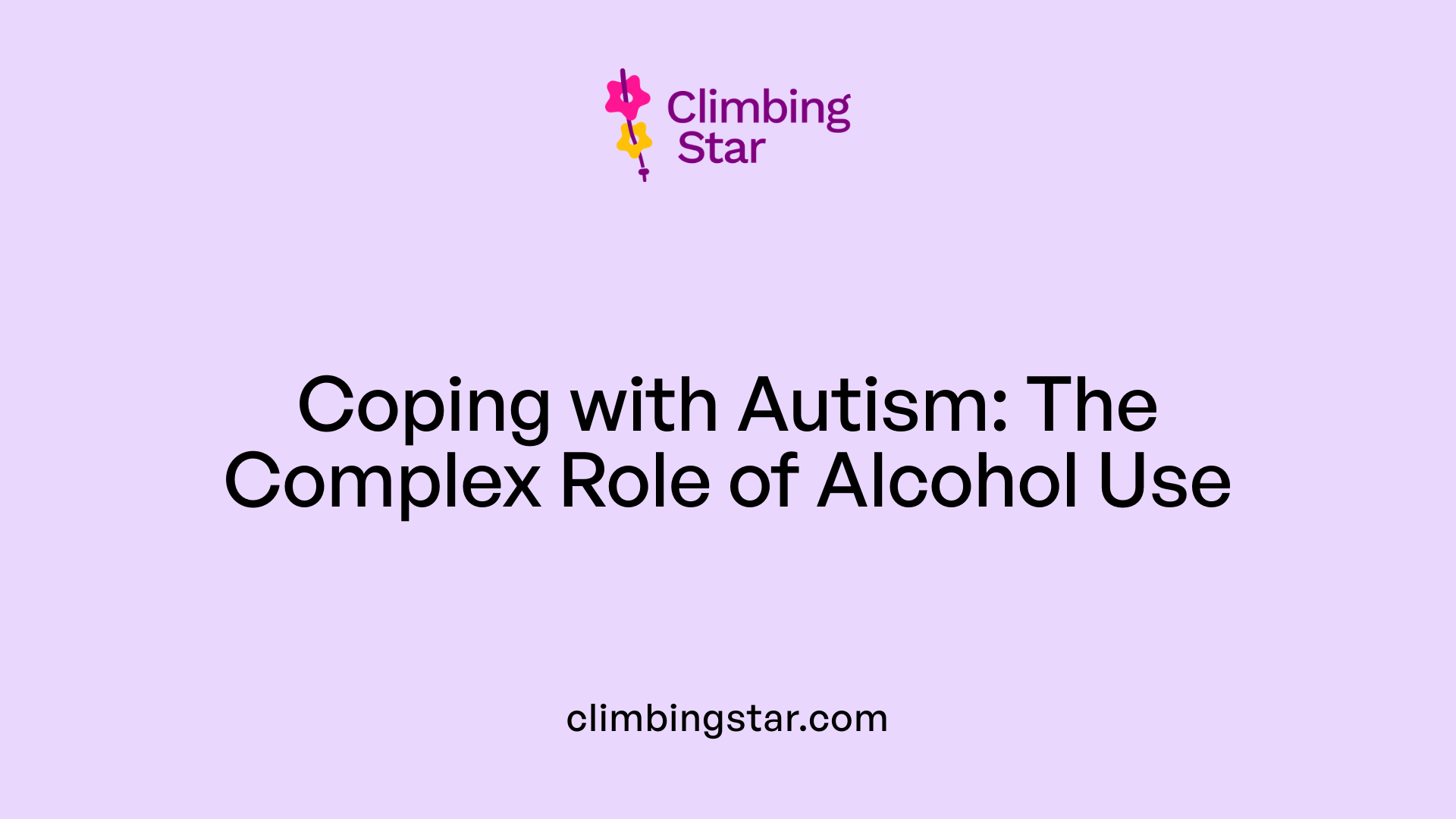
Do autistic individuals use alcohol as a coping mechanism?
Autistic individuals sometimes turn to alcohol as a way to manage the challenges associated with their condition. This includes difficulties with anxiety, sensory sensitivities, and social interactions.
Alcohol can provide temporary relief from these issues by reducing feelings of sensory overload and social anxiety. In noisy environments or social settings that might otherwise cause discomfort, alcohol can help some autistic people to function more comfortably.
However, relying on alcohol as a coping strategy can lead to risks such as dependence or misuse. It also complicates understanding whether alcohol use is a symptom of underlying struggles or a tool someone uses to navigate their environment.
To address these issues safely, tailored interventions like cognitive-behavioral therapy (CBT) are recommended. These therapies aim to build healthier coping mechanisms and reduce reliance on substances like alcohol, helping individuals manage their anxieties and sensory challenges more effectively.
Understanding the role of alcohol in autism highlights the importance of providing support that respects each person's needs while promoting healthier, sustainable strategies for managing stress and sensory sensitivities.
Increased Risk of Alcohol Misuse Among Autistic Individuals
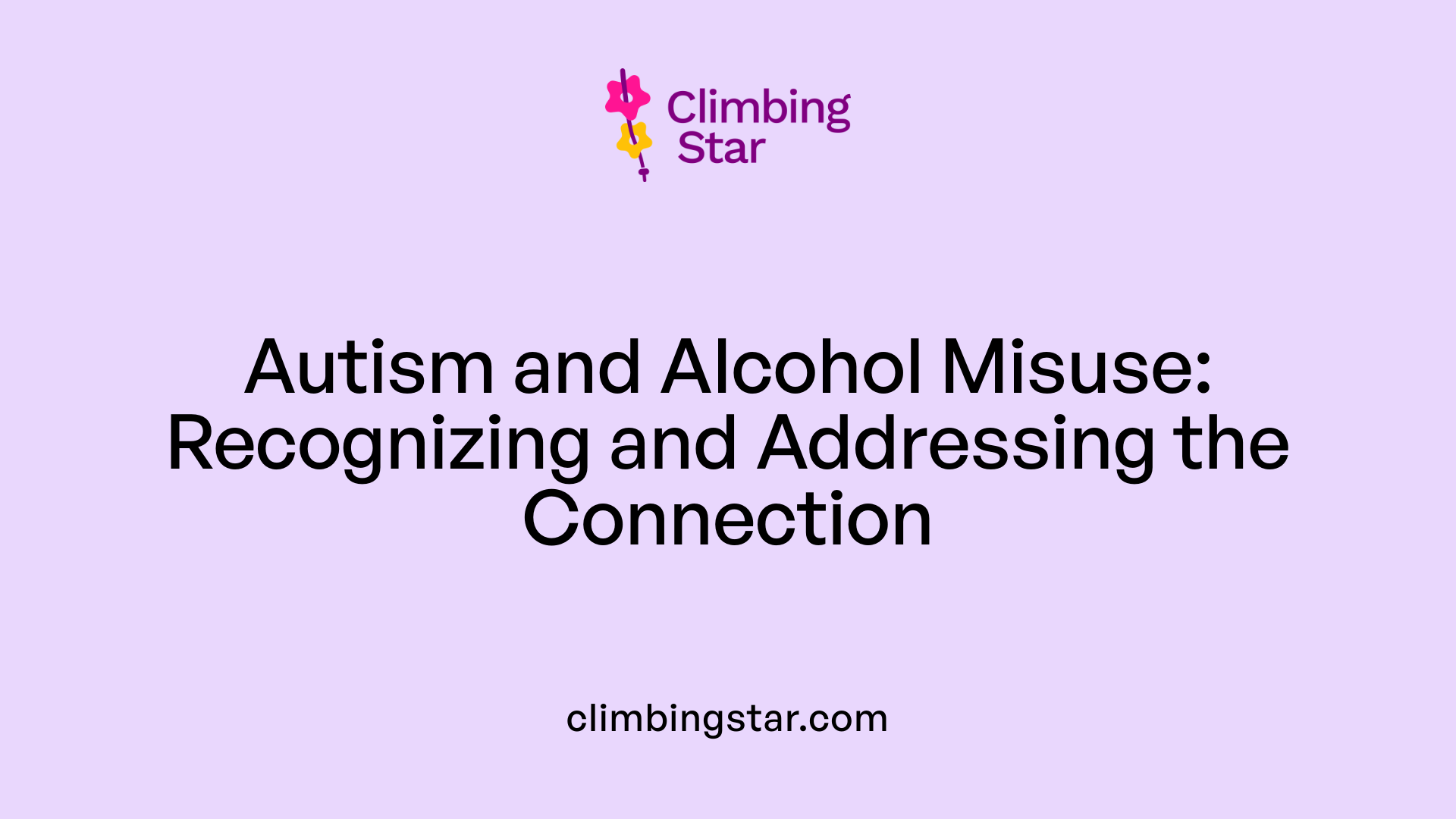
Is there a link between autism and increased risk of alcohol misuse?
Research indicates a possible connection between autism and a higher likelihood of alcohol misuse. This relationship may partly stem from the tendency of some autistic individuals, diagnosed or undiagnosed, to use alcohol as a coping mechanism. Many turn to alcohol to manage symptoms such as anxiety, sensory overload, or social difficulties that they find challenging.
Recognizing the signs that might suggest an autistic person is struggling with alcohol issues is important. Some telltale indicators include unusual eye contact, strong or peculiar interests, and atypical language use. These signs can help caregivers and health professionals identify individuals who may need additional support.
Supporting autistic individuals facing alcohol-related challenges demands tailored approaches. Adapted therapies like cognitive-behavioral therapy (CBT), alongside robust social support systems, can address their specific anxieties and difficulties. It is essential to understand both the neurodevelopmental and substance use aspects to provide effective assistance.
By acknowledging the potential for increased risk and implementing supportive strategies, we can better help autistic individuals navigate their unique challenges while reducing the dangers associated with alcohol misuse.
Other Factors Not Linked to Autism Risk
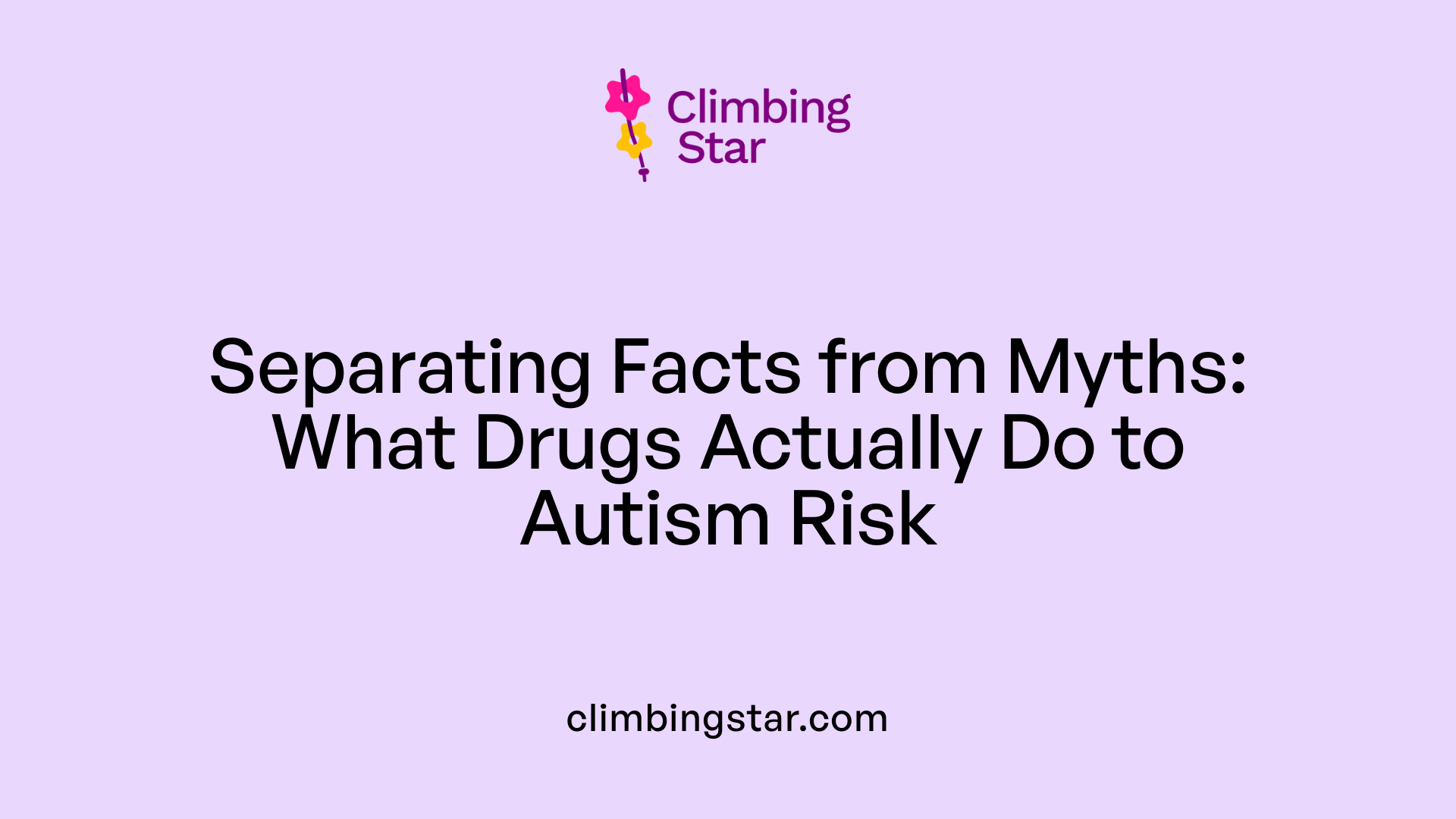
Are there other drugs or medications during pregnancy that influence autism risk?
Research indicates that most illegal drugs used during pregnancy do not directly cause autism spectrum disorder (ASD). Cocaine use during pregnancy can increase the risk of ASD from 1.9% to as high as 11.4%, but it is important to note that most mothers who use cocaine do not have children with ASD. Marijuana and opioid use in pregnancy have not been found to raise the likelihood of ASD.
Certain medications, such as some anti-seizure drugs like valproate, are associated with a higher risk of ASD. Valproate specifically can increase the risk from approximately 1.9% to about 4.4%. Meanwhile, scientific data has not proven any connection between antidepressant or antipsychotic drug use and ASD.
Is paternal drug use prior to or during conception linked to autism?
Studies show that paternal drug use before or during the process of conception does not significantly affect the risk of ASD. This suggests that paternal substance use is not a major contributing factor in autism’s development.
Overall, while some drugs and medications can impact fetal health in various ways, most are not directly linked to an increased risk of ASD. Alcohol, for example, is known to cause fetal alcohol spectrum disorder (FASD), a separate condition involving physical and developmental issues, but it does not correlate specifically with ASD. Maintaining awareness of these distinctions can guide expectant parents and healthcare providers in making informed choices.
For more information, searching using the keywords "drugs, medications, and paternal influences in autism risk" can provide a broad overview of how different substances may or may not impact the development of autism.
Summary and Final Takeaways
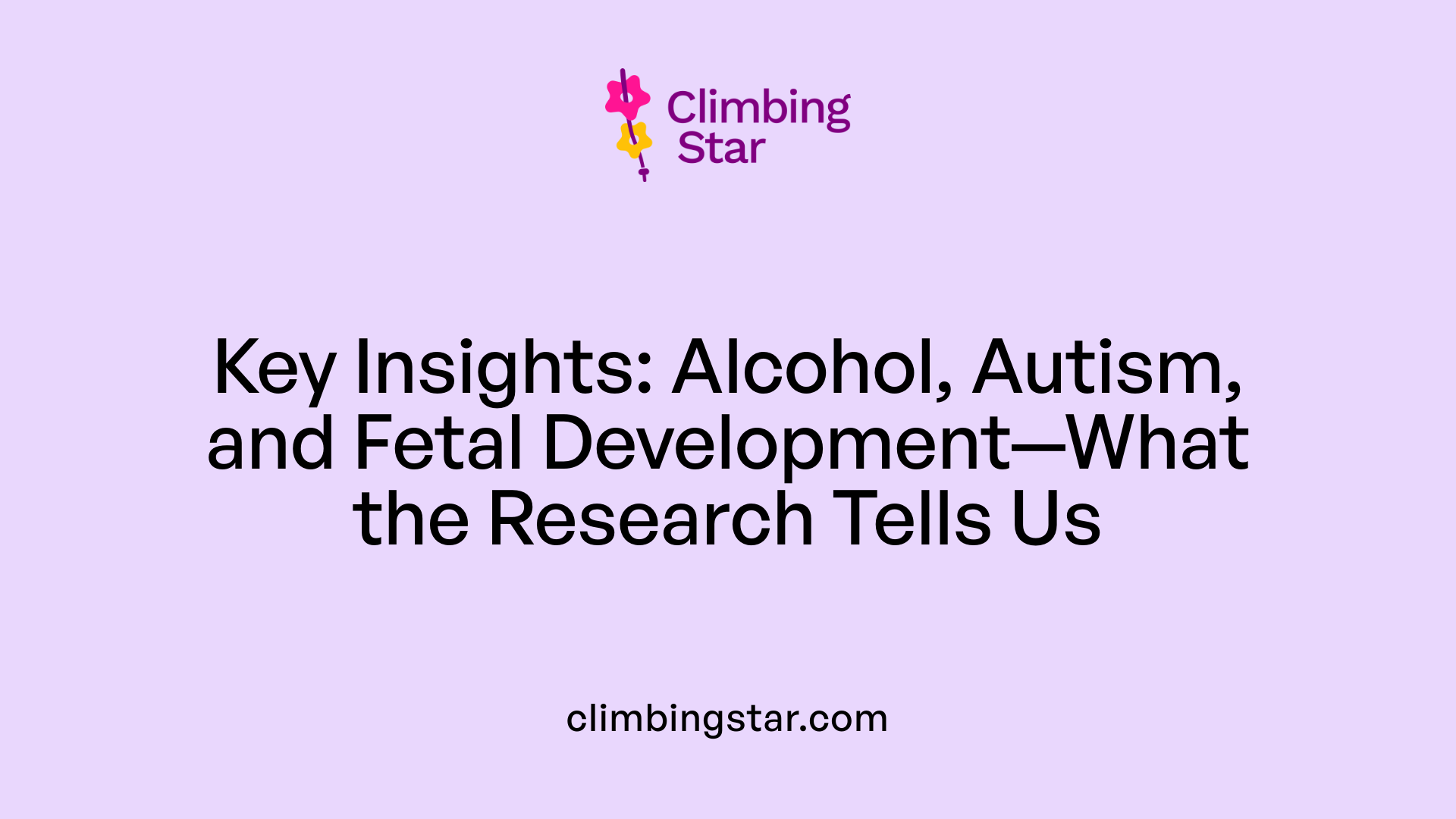
What does current scientific research conclude about alcohol and autism causation?
Recent studies show no conclusive evidence that alcohol consumption during pregnancy directly causes autism spectrum disorder (ASD). While high prenatal alcohol exposure is linked to broader neurodevelopmental issues, including physical and cognitive deficits known as fetal alcohol syndrome (FAS), low to moderate alcohol intake does not appear to increase ASD risk.
Some research even hints at an inverse association, suggesting light alcohol use might be linked to a reduced risk of ASD. However, this is likely due to biases or confounding factors rather than a true protective effect. Importantly, these findings do not justify alcohol consumption during pregnancy.
Science emphasizes that alcohol is a teratogen—substances that can cause developmental malformations. Any amount of alcohol intake during pregnancy can pose risks, affecting physical and mental fetal development. Therefore, experts strongly advise complete abstinence from alcohol during pregnancy.
Understanding of autism also recognizes it as a complex neurodevelopmental disorder influenced by genetic, environmental, and possibly epigenetic factors, rather than a single cause like alcohol use. Ongoing research continues to unravel these complex interactions, aiming to better inform health guidelines and support strategies.
| Aspect | Findings | Additional Details |
|---|---|---|
| Alcohol and ASD risk | No clear link | Light drinking might seem protective due to biases, but evidence remains inconclusive |
| Fetal alcohol syndrome | Caused by alcohol | Distinct from ASD; involves physical and developmental defects |
| Other substances | Less risk | Drugs like marijuana or opioids during pregnancy do not increase ASD risk |
| Medication | Some exceptions | Certain anti-seizure medications like valproate increase risk from 1.9% to 4.4% |
| Paternal drug use | No link | No evidence suggests paternal use affects ASD risk |
| Summary | No conclusive causation | Alcohol during pregnancy remains unsafe, with no known safe level |
Ultimately, avoiding alcohol during pregnancy is crucial for healthy fetal development. The complex origins of autism extend beyond alcohol use, involving genetic and environmental factors still being researched.
Summary and Final Thoughts
The relationship between alcohol and autism is nuanced and largely non-causal according to current research. While alcohol consumption during pregnancy is definitively linked to fetal alcohol spectrum disorders, it does not have a proven direct connection to autism spectrum disorder. Nonetheless, alcohol poses substantial risks to fetal health and development, reinforcing the importance of abstinence during pregnancy. Autism’s origins appear to be multifactorial, involving a combination of genetic and environmental factors, with no singular cause firmly established. As science advances, ongoing research remains crucial to unraveling the complexities of autism and ensuring informed guidance for prospective mothers and families.
References
- Prenatal Alcohol Exposure in Relation to Autism Spectrum ...
- Autism and alcohol
- Can drugs and alcohol cause autism?
- Fetal Alcohol Syndrome (FAS): Symptoms, Causes & ...
- Alcohol use among populations with autism spectrum ...
- Sensory processing and alcohol use in adults with autism ...
- Autistic traits and alcohol use in adolescents within the ...
- Autism Spectrum Disorder and Fetal Alcohol ...
- Prenatal Maternal Alcohol Exposure During the First ...






